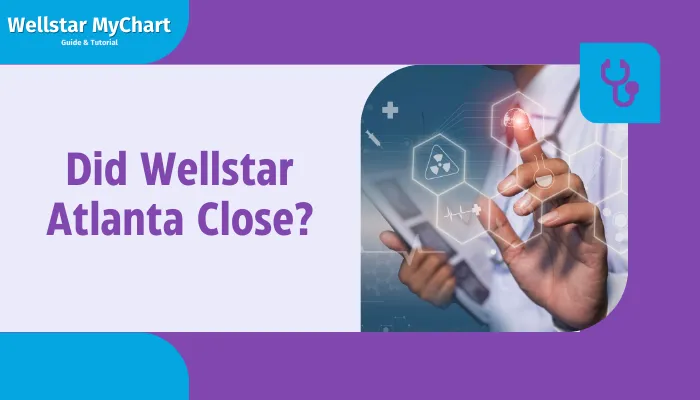Are you wondering “Did Wellstar Atlanta Close?” then let me tell you that Wellstar Atlanta Medical Center stopped operating on November 1, 2022: a notable occurrence within the local healthcare setting.
Other than downtown and South campuses for East Point, it was left with the community to think about what that means. This step followed cost difficulties, developing healthcare circumstances, and needs of the population.
With this change in healthcare scene in Atlanta, however, other issues such as access, employment and future healthcare policies become central issues. Let us find out why and how Wellstar Atlanta closed, as well as its implications on health support delivery in future.

Wellstar Atlanta Medical Center Closure
Before we get into the specifics of Did Wellstar Atlanta Close? here is the short answer:
- Indeed, as of 1st November 2022, Wellstar Atlanta Medical Center closed its doors.
- Both the primary campus downtown and the South campuses in East Point were impacted by the closing.
- This left many people within the vicinity uncertain about the implications of their actions on the local healthcare sector.
So now that we know what’s good for us let’s deep dive into this altogether matter.
Wellstar Atlanta Timeline
To know why it shut down, we need to look at events preceding its closure. A quick timeline will help:
1. Announcement by Wellstar on August 31st, 2022 to close down Atlanta Medical Center 2. Attempting to save the hospital; popular protests; September 2022 3. Final preparations before shutdown took place in October 2022 4. The official closure date was November 1st, 2022 for Wellstar Atlanta Medical center .
Why Did Wellstar Atlanta Close?
But did that imply that Wellstar Atlanta closed because of one reason only? That’s not entirely true rather several factors led to this decision:
Financial Struggles
Let’s talk dough here! Major financial losses are stated as one of main causes for shutting down cited by wellstar. Just check these interesting facts out:
| Year | Reported Losses |
|---|---|
| 2021 | $107 million |
| 2022 | $91 million |
Challenges Faced by Wellstar Atlanta
As it happens to all areas, there are hard times Wellstar Atlanta had to face:
- A change in offering outpatient care
- Increasing competition from specialized clinics
- Escalating expenses of medical facilities and supplies.
Community Demographics
The area surrounding Wellstar Atlanta had its own unique issues:
- Large numbers of uninsured people
- Growing demand for free healthcare services
- Complex health requirements among local residents
The closure of WellStar Atlanta was occasioned by complex interlude of financial constraints, shifting dynamics in healthcare, and community needs which only point at wider issues in local healthcare service delivery.
What Happened When Wellstar Atlanta Closed?
So, Wellstar Atlanta closed. But what does that mean for the community? Let’s go into more detail:
1. Healthcare Access
- Downtown Atlanta loses a major trauma center
- Intensifies pressure on other hospitals in the vicinity,
- Prolongs waiting time for emergency treatments.
2. Job Losses
- Nearly two thousand employees being affected by this situation,
- This also has an effect on other businesses that serve staff and visitors at other hospitals locally.
3. Community Health Concerns
- Concerns about how to deal with future health crises or mass casualty events,
- Potential deficits in dedicated care provision.
The closure of Wellstar Atlanta had far-reaching effects on health access, unemployment and fears about community preparedness for future challenges.
Controversy about the Closure of Wellstar Atlanta
This decision has been debated hotly. Now let us look at both sides of the argument:
Arguments Supporting the Closure
- Long-term sustainability for continued healthcare provision is important;
- Find better applications for resources than these old-fashioned models;
- Give chance to reassess and improve healthcare dispensation within the region.
Arguments Against the Closure
- Lose a key resource in a medically underserved area;
- Worries concerning profit driven decisions within health care;
- It may exacerbate health discrepancies between groups living closeby.
The Aftermath of Wellstar Atlanta’s Closure
So, Wellstar Atlanta closed. What now? Since the shutdown, here’s what has been going on:
- Redistribution of Patients: Other hospitals in the area have had to absorb the patient load.
- Community Health Initiatives: Local organizations are stepping up to fill gaps in care.
- Political Discussions: The closure has sparked debates about healthcare policy at local and state levels.
- Property Repurposing: There’s talk about how to use the now-vacant hospital buildings.
In the aftermath of Wellstar Atlanta’s closure, the community has seen patient redistribution, increased community health efforts, lively healthcare policy debates, and discussions on repurposing hospital facilities.
What Can We Learn?
The issue of Wellstar Atlanta’s closure was not merely local, but a reflection of larger problems with American health care:
- Difficulties in providing medical attention in underserved locations
- Determining between financial viability and community needs
- Influence of healthcare policies on local communities
Wellstar Atlanta’s closure therefore highlights broader problems in American healthcare including gaps in access to care, tensions between financial viability and public service obligations and impacts of policy actions related to health care on specific communities. Have you checkout Wellstar MyChart login page?
Conclusion
So, that is all! Did Wellstar Atlanta Close? Yes, it did. But as we saw earlier, this story is far from just about a closing up of things and more needs to be done. It addresses issues such as community health, financial realities and changing nature of healthcare in America.
The closure of Wellstar Atlanta will definitely leave an indelible mark on the city’s healthcare system as Atlanta advances. This exemplifies striking a delicate balance between providing care and maintaining financial stability in our healthcare institutions.
What are your thoughts on this eventuality? How has it affected you or your community? This conversation is not over yet and your opinion counts toward shaping the future of healthcare in Atlanta and beyond.
